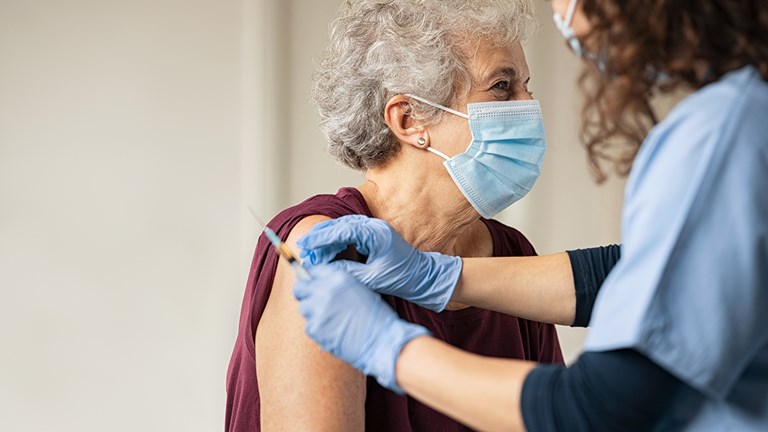All adults over 50 will be eligible for a CODID booster jab six months after their second dose, and should be able to book their booster without the need to wait for the NHS invitation.
On the 21st October, the Government advised that if six months plus one week had passed, eligible people should go on the National Booking System and book their booster vaccine.
What is coronavirus or COVID-19?
COVID-19 is an infectious respiratory disease caused by the SARS-CoV-2 virus. It can be more serious in older people and those with certain health conditions.
Why should I get the COVID-19 booster vaccine?
All COVID-19 vaccines available in the UK provide a very high level of protection from developing the symptoms of the virus. If you do contract the virus you are much less likely to develop severe symptoms and require hospitalisation if you have had the full recommended course of vaccinations.
To maintain a high level of protection through the colder months and the flu season, a booster jab is recommended and is currently being offered to those at the greatest risk of serious problems from COVID-19. A booster vaccine will prolong your protection and reduce the chance of hospitalisation.
How long since your second dose do you have to wait before having your booster?
You should have the booster no earlier than 6 months after you received your second dose of the COVID-19 vaccine. The NHS will invite you for your booster dose when it’s time. If after a week from your 6 month eligibility date, you’ve not heard from the NHS inviting you to book your booster, then you should book your appointment using the National Booking Service.
How do I check when I’m eligible for the COVID booster?
If you are unsure how long it has been since you had your last jab, you can use the NHS vaccine record service to see when you had it or download the NHS app.
Which vaccine is given for the COVID-19 booster?
The NHS advises that the Pfizer-BioNTech vaccine (which now also has a brand name, “Comirnaty”) should be given for the booster dose, regardless of which vaccine type you received for your first and second doses; clinical trials have shown this is well tolerated and provides a strong booster response.
Alternatively, a Moderna Booster vaccine may be given; or if you’re unable to receive either of these vaccines, for example due to allergies, the AstraZeneca vaccine may be given to those who received it previously.

Who is currently eligible for the booster vaccine?
The booster vaccine is being offered to the most vulnerable people first, following the same pattern we saw at the start of the COVID-19 vaccination programme.
Therefore, those who are currently eligible to receive the booster vaccine include people in these categories, whose second COVID-19 vaccine dose was given over 6 months ago:
- all adults aged 50 years or over
- frontline health and social care workers
- those living in residential care homes for older adults
- all those aged 16 to 49 years with underlying health conditions that put them at higher risk of severe COVID-19, and adult carers
- adult household contacts of immunosuppressed people
The NHS will announce when it's your turn to have the vaccine or booster. You can then go to the NHS National Booking System to book your appointment. If you’ve selected a Pharmacy2U location, we’ll be ready to welcome you at our vaccination clinic.
Side effects
Common side effects
The common side effects are the same for all COVID-19 vaccines used in the UK, including the booster vaccine, but not everybody gets them. They can include:
- A painful feeling and tenderness in the arm where you had your injection, tending to be worst around 1-2 days after receiving the vaccine
- Tiredness
- Headaches
- Achiness, or flu-like symptoms
You can rest and take paracetamol (follow the advice in the packaging) if necessary, to help you feel better. Although a fever (high temperature) can occur for one or two days after vaccination, if you have any other COVID-19 symptoms or if your fever lasts longer, stay at home and arrange to have a test. Any side effects following vaccination normally last less than a week. If you experience any and they seem to get worse or if you are concerned, you can call NHS 111 or talk to your pharmacist.
You can also report suspected side effects of vaccines and medicines through the Government’s Yellow Card scheme.
Serious side effects
Worldwide, there have also been recent, and very rare, cases of inflammation of the heart (called myocarditis, or pericarditis) reported after the use of the Pfizer and Moderna COVID-19 vaccines.
These cases have been seen mostly in younger men within several days after vaccination. Most of these people recovered and felt better following rest and simple treatments.
As a precaution, you should seek medical advice urgently if, after vaccination, you experience:
- Chest pain
- Shortness of breath
- Feelings of having a fast-beating, fluttering, or pounding heart
If you had serious side effects after any of your previous doses of the vaccine, you may be advised to avoid or delay further vaccination. You should discuss this with your doctor or specialist.
Can you still catch COVID-19 after having the booster vaccine?
The vaccine will reduce the chance of you catching COVID-19, and the chance of you becoming seriously ill if you do catch it. It may take a few days for your body to build up some protection from the booster.
Like all medicines, no vaccine is completely effective, and some people may still catch COVID-19 and display symptoms despite having a vaccination, but they will be less severe in the majority of cases.
Can I have the flu vaccine at the same time as my COVID booster?
Yes. Clinical trials have shown that there is no reduction in immune response to either vaccine when they are given at the same time, and it is safe to administer both injections together; they will usually be given in different arms. It is highly recommended to book both your booster and flu vaccine as soon as possible and ahead of the winter months, to protect yourself from the complications and the risk of serious illness from both these viruses. Having COVID-19 and flu at the same time significantly increases the risk of hospitalisation and death, so vaccination is especially important this winter.
You can book your flu jab here or speak to a member of the team at our clinics when you attend your COVID-19 booster appointment.
Further Information
- Pharmacy2U COVID-19 vaccination services
- Pharmacy2U Flu vaccination services
- Coronavirus vaccinations available at Pharmacy2U
- An information leaflet on what to expect after vaccination is available to download or order.
